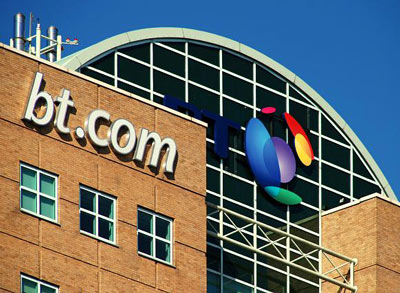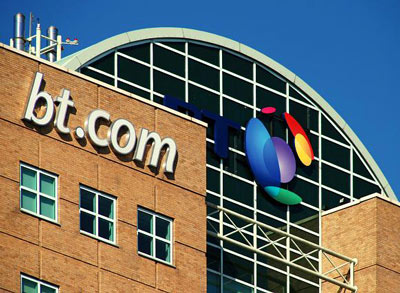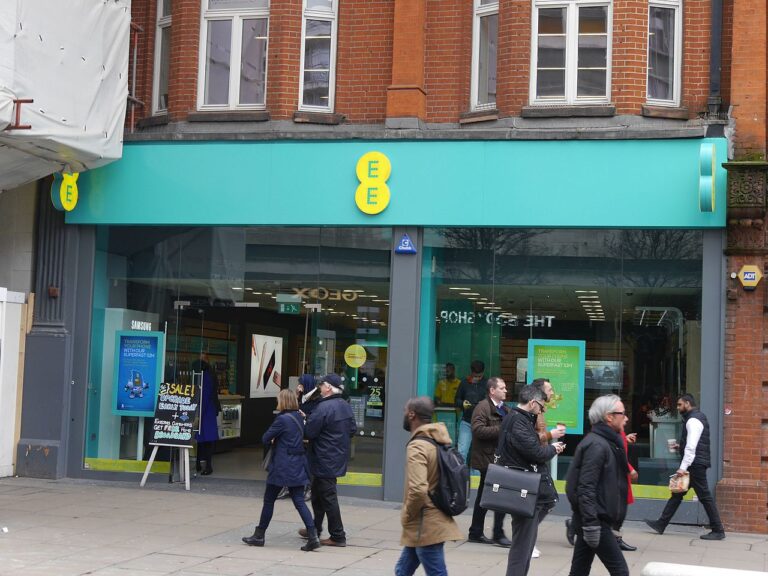BT Group plc (LON:BT.A) has announced its trading update for the three months to 30 June 2020.
Key strategic developments:
• BT delivered a strong operating performance and remains committed to supporting our customers and colleagues. Financial results impacted by Covid-19
• Openreach committed to build FTTP to 3.2m premises in rural areas by 2025/26, subject to enablers including extension of indexation across the whole country. Continued progress towards 20m FTTP target
• Openreach to stop selling copper products to c.1.2m FTTP-enabled premises in 117 exchange areas from June 2021
• Further work required to comply with additional restrictions on the use of Huawei equipment but no anticipated impact on coverage or rollout of 5G and full fibre; cost expected to be absorbed within previously reported estimate of £500m
• Enterprise launched major new scheme to support small businesses in being better positioned for growth following Covid-19
• 16 successive quarters of improvement in Group NPS1
• Rob Shuter appointed CEO of Enterprise unit; Gerry McQuade to retire from BT
Operational:
• Openreach continues FTTP rollout with 3m FTTP premises now passed; on track to achieve 4.5m by March 2021
• Consumer fixed ARPC £36.4, down 4% year on year due to continued market competition and residential BT Sport revenue decline; postpaid mobile ARPC £19.6, down 5% due to decline in roaming and out of bundle revenues, and continued trend towards SIM-only; RGUs per address 2.41
• Postpaid mobile and fixed churn both down to 1% in Q1 due to low market activity during lockdown
Financial:
• Revenue £5,248m, down 7% primarily due to the impact of Covid-19, including reduced BT Sport revenue and a reduction in business activity in our enterprise units
• Adjusted1 EBITDA £1,813m, down 7%, driven by the fall in revenue and continued investment in customer experience, partly offset by Covid-19 mitigating actions and savings from our transformation programmes
• Reported profit before tax £561m, down 13%, due to reduced EBITDA, higher interest expense, and higher depreciation and amortisation charges; partly offset by the gain on disposal of our Spanish operations
• Negative Q1 normalised free cash flow1 reflects Covid-19 pressures on EBITDA combined with the usual Q1 pressures on working capital due to the timing of public sector collections, capex creditors and payment of management bonus. Normalised free cash flow1 declined by £372m to an outflow of £(49)m driven by Covid-19 impacts on EBITDA and extended customer payment terms, as well as some one-off cash flows which benefited the prior year including the upfront cash payment received from Cellnex
• Capital expenditure broadly flat at £927m, with higher network investment offset by lower customer and non-network infrastructure spend
• Outlook for 2020/21: adjusted1 revenue down 5% – 6%; adjusted1 EBITDA £7.2bn – £7.5bn; reported capital expenditure £4.0bn – £4.3bn; normalised free cash flow1 £1.2bn – £1.5bn
1 See Glossary on page 5
Philip Jansen, Chief Executive, commenting on the results, said
“Despite Covid-19, BT delivered a strong operating performance in the first quarter and delivered a relatively resilient set of financial results. We continue to invest in the long-term future of the business. We continued to support our customers and colleagues through the crisis, including offering NHS workers on EE unlimited mobile data, and discounts for pubs and clubs on BT Sport until the end of the year. During the quarter Openreach resumed provisioning and repair activity in customer premises, we re-opened the majority of our retail stores, and we saw the restart of the Premier League on BT Sport. Enterprise has today launched the BT Small Business Support Scheme, which will boost cash flow, connectivity and confidence among this critical segment of the economy over the coming months.“Throughout this crisis we remain focussed on delivering against our strategic goals to deliver long-term value for shareholders. We reached an important milestone with 3m FTTP premises now passed, welcomed Ofcom’s consultation on our rural FTTP build proposal, and have now deployed 5G to 100 towns and cities. Together with continued improvements in customer experience and our modernisation programme, we are positively positioned for the future.
“Although uncertainties remain, we are now able to provide an outlook for this financial year. Despite our strong operational performance in the first three months of the year, it is clear that Covid-19 will continue to impact our business as the full economic consequences unfold. Beyond this year and based on current expectations, we expect to return the business to sustainable adjusted EBITDA growth, driven in part by the recovery from Covid-19.”
Overview of the three months to 30 June 2020
Consumer: strong service performance, Covid-19 headwinds to reduce
Q1 was impacted heavily by Covid-19. With limited sport to broadcast, revenues from both residential customers and pubs and clubs declined. Trading was also impacted by the closure of our retail stores, although increased digital transactions and improved churn provided some mitigation. EBITDA declined due to lower revenues and continuing investment in the fairness commitments made to Ofcom, although it was supported by lower recruitment, reduced sales related costs, sports rights rebates and savings in production costs. Covid-19 continues to impact Consumer, mainly through lower roaming and pay-as-you-go revenue, sport revenue from pubs & clubs, and more price-conscious customers. Churn levels improved quarter on quarter, aided by the low market activity. Service performance during lockdown has been robust, benefiting from UK-based customer services, 160 stores converted to mini-call centres and excellent network performance. At the end of Q1 we had c.80% of our stores open post national lockdown. Complaints to Ofcom about BT broadband fell by 44% year on year to an all-time low, remaining below the industry average for three consecutive quarters. EE won all seven Rootmetrics’ awards for UK-wide mobile network performance in the first half of 2020.
Enterprise: slower business activity but continuing to lower costs
Revenue was down primarily due to ongoing declines in legacy products and sharply reduced business activity across Enterprise as a result of Covid-19. In particular, our SME segment has seen lower call volumes, and fewer sales and upgrades across both fixed and mobile. Our Wholesale business has been similarly affected. Excluding the divestments of Fleet and Tikit in the prior year our revenue was down 6% and EBITDA was down 12%. The decline in profit was mainly as a result of Covid-19, partly offset by lower costs from our transformation programme. Our order intake in the quarter declined, in part driven by contract delays as a result of the pandemic. This contributed to the 12-month rolling Wholesale order intake declining 15% to £1.0bn. By contrast, the Retail order intake was up 14% at £3.4bn on a 12-month rolling basis following a strong fourth quarter. We have been working hard to support our customers during the pandemic, including flexible payment terms to support SMEs and recently announced the BT Small Business Support Scheme. However, we expect to see a further impact from Covid-19 in future quarters as a result of business insolvency, slower decision making by our larger customers, and lower usage across our SME and Wholesale businesses.
Global: transformation and cost mitigating actions drive EBITDA growth
Covid-19 negatively impacted revenue in the quarter but did not materially impact EBITDA as lower non-contracted business and milestone slippage were offset by higher conferencing volumes and cost mitigation. Revenue decline was driven by the impact of Covid-19, divestments, our strategic decisions on low margin business and legacy portfolio declines partly offset by a £6m positive impact from foreign exchange movements. EBITDA was up 1% as lower revenue and the impact of divestments were more than offset by lower operating costs reflecting ongoing transformation, certain one-offs, Covid-19 mitigation actions including reducing discretionary spend, optimising resourcing and working with external suppliers to drive additional cost efficiencies, and a £3m positive impact from foreign exchange movements. At the end of May we completed the sale of our domestic business in Spain. Excluding this divestment our revenue was down 7% and EBITDA was up 4%. Order intake in the quarter was £0.8bn, up 57% benefiting from a number of renewals including Bristol-Myers Squibb. On a rolling 12-month basis it was £4.6bn, up 46% year on year. Looking forward, due to the impact of Covid-19 we are seeing a reduction in spending and a more cautious approach from our multinational customers resulting in cancellations and delays to purchasing cycles that will negatively impact revenue and EBITDA. In July we agreed the sale of our domestic operations in France which we expect to complete by the end of 2020.
Openreach: FTTP build on track and service levels maintained
Revenue growth year on year was driven by higher rental bases in fibre3, up 19%, and Ethernet, up 10%, partially offset by decline in legacy products and price reductions (reflecting the impact of Openreach’s volume related discounts). EBITDA grew 2% year on year with revenue growth partially offset by higher operating costs. The increase in operating costs was primarily driven by investment in people to deliver better service, partially offset by ongoing efficiency programmes. The quarter has been impacted by Covid-19 driving lower churn between providers in the market that reduced provisioning and upgrade activity, but also reduced ceases across all products. We mitigated some of the Covid-19 impact by short-term reductions in discretionary spend and overtime payments, and re-phasing of recruitment. Take up of FTTP was also impacted by lockdown, but has now accelerated with 10k orders received in a single week in June, primarily from BT’s Consumer unit. In the quarter, Openreach achieved 41 of Ofcom’s 42 quality of service levels on voice and broadband service, including FTTC, despite service having been heavily impacted by Covid-19, with MBORC (Matters Beyond Our (Openreach’s) Reasonable Control) invoked for much of the quarter.
1 See Glossary on page 5. Commentary on revenue and EBITDA is based on adjusted measures
2 On 1 April 2020, Supply Chain and Pelipod, which serve several parts of BT, were transferred from Enterprise to the central procurement team and as a result will now be reported in Group ‘Other’ financial results. The prior year comparative for the Enterprise and Other CFU results has been restated to reflect this. Refer to the announcement on 29 June 2020 for further information
3 FTTP, FTTC and Gfast (including Single Order migrations)
FINANCIALS FOR THE THREE MONTHS TO 30 JUNE 2020
Income statement
Reported revenue was £5,248m, down 7%, due primarily to the impact of Covid-19, including reduced BT Sport revenue and a reduction in business activity in our enterprise units, particularly within SME and Wholesale. The decline in revenue was also driven by ongoing legacy product declines in our enterprise businesses but partially offset by higher rental bases of fibre-enabled products and Ethernet in Openreach.
Adjusted1 EBITDA of £1,813m was down 7% or £145m, mainly driven by the fall in revenue, continued investment in customer experience and higher operating costs in Openreach; partly offset by Covid-19 mitigating actions such as short-term reductions in discretionary spend, and cost savings driven by our transformation programmes. The movement in Other EBITDA partly reflects a lower release of bonus accruals than the prior year.
Reported profit before tax was £561m, down 13% or £81m. This reduction was driven by the reduced EBITDA and higher interest expense, and higher depreciation and amortisation charges, partly offset by a specific item gain in the quarter of £11m. This compares to a specific item loss of £107m in the prior year. The gain includes profit of £82m recognised on completion of the disposal of our Spanish operations in the quarter. There are no changes to the Covid-19 adjustments recognised in relation to various balance sheet items in Q4 last year.
Tax
The effective tax rate was 20.1% on reported profit and 21.8% on adjusted1 profit, based on our current estimate of the full year effective tax rate.
Capital expenditure
Capital expenditure was £927m (2019/20: £931m). Network investment was £526m, up 2%. This reflects continued investment in FTTP deployment. Other capital expenditure components were down 3% with £204m spent on customer-driven investments, £170m on systems and IT, and £27m spent on non-network infrastructure.
Normalised free cash flow
Negative Q1 normalised free cash flow1 reflects Covid-19 pressures on EBITDA combined with the usual Q1 pressures on working capital due to the timing of public sector collections, capex creditors and payment of management bonus. Normalised free cash flow1 declined by £372m to an outflow of £(49)m driven by Covid-19 impacts on EBITDA and extended customer payment terms, as well as some one-off cash flows which benefited the prior year including the upfront cash payment received from Cellnex.
Net debt and liquidity
Net debt1 was £18.2bn at 30 June 2020, £0.2bn higher than at 31 March 2020 (£18.0bn). Excluding lease liabilities, net financial debt was £11.7bn, £0.4bn higher than at 31 March 2020 (£11.3bn). The increase was mainly driven by £0.4bn of contributions to the BT Pension Scheme, £1.1bn net capital expenditure, £0.2bn payment of lease liabilities and £0.3bn net interest payments; partly offset by net cash inflow from operating activities (excluding pension contributions) of £1.4bn and net proceeds from disposals of subsidiaries of £0.2bn.
Outlook for 2020/21
Although uncertainties remain, we are now able to provide an outlook for this financial year.
Covid-19 will continue to impact our business as the full economic consequences unfold and as a result we expect adjusted1 revenue to be down between 5% and 6% in 2020/21, and adjusted1 EBITDA to outturn between £7.2bn and £7.5bn.
Beyond this year and based on current expectations, we expect to return the business to sustainable adjusted EBITDA growth, driven in part by the recovery from Covid-19. This recovery will be enhanced by the existing drivers of near-term growth in our business, with sales of our converged and growth products and savings from our modernisation programme starting to offset regulatory headwinds and legacy product declines.
As we accelerate our FTTP build, and continue to invest in 5G and the modernisation of BT, we expect reported capex for this year to increase to between £4.0bn and £4.3bn. We expect this to result in normalised free cash flow1 in a range of £1.2bn to £1.5bn.
OTHER DEVELOPMENTS
Regulation
Covid-19 response
Ofcom has responded positively to the work BT has done for the country during the Covid-19 pandemic. We continue to brief them regularly on our response to the situation, our plans to “unwind” some initiatives at the right time, and our learnings from the initial lockdown period.
Some elements of the contractual MBORC (Matters Beyond Our (Openreach’s) Reasonable Control) declared in Q4 last year remain in place. This position is under regular review, with Ofcom fully informed of developments.
Wholesale Fixed Telecoms Market Review (WFTMR) 2021-2026
In May, we submitted our response to Ofcom’s WFTMR. The full response is published on Ofcom’s website alongside all communications providers’ (CPs’) responses. We still expect Ofcom to finalise its proposals prior to April 2021.
In July, Ofcom published a follow up consultation on the approach to investment in Area 3 and Openreach’s commitment to build in Area 3 in the next five years. Ofcom proposes to extend the fibre “regulatory enablers” into Area 3. We will review the proposals in detail and provide our response by the deadline in September. Further follow up consultations are likely.
Broadband universal service obligation (USO)
We have now started to send out letters to potentially eligible customers in areas where Openreach streetworks have not been affected by Covid-19. In May, Ofcom confirmed that they will establish an industry fund for providers that can demonstrate the costs incurred are an unfair burden. For the fund to be triggered, BT will need to submit detailed costs demonstrating the net burden of delivering the USO.
Spectrum auction
Ofcom has indicated that bidding in the upcoming auction of 700MHz and 3.6GHz spectrum in the UK will be in November 2020 at the earliest, taking into account the impact of the Covid-19 pandemic and other considerations. BT expects to participate in the auction to support its 5G leadership position.
Consumer fairness
We will formally report to Ofcom on our adherence to its Fairness for Customers Commitments in the autumn. From Q1 EE mobile handset customers now benefit from a percentage discount 3 months after contract end, and prices have now been reduced for non-fibre-eligible out of contract (OOC) consumers remaining on copper broadband, and for OOC vulnerable broadband customers who were previously paying more than the standard OOC price.
In July, the Competition and Markets Authority (CMA) provided their latest update on the ‘loyalty penalty’, noting that vulnerable customers have been disproportionately affected by Covid-19 and continuing to make the case for additional powers to tackle harmful pricing practices. The CMA will continue to monitor Ofcom’s work in this area and the impact of CPs’ commitments on prices.
In July, Ofcom published their latest Broadband Pricing Report stating that they have secured additional pricing commitments from all the main CPs since the last update, but that there is room for providers to do more to protect their vulnerable customers from high out-of-contract prices.
European Electronic Communications Code (EECC)
Ofcom has agreed with the Government to keep the implementation date of the EECC consistent with the EU date of 21 December 2020. As CPs will need additional time to make the necessary changes in their systems and processes to comply with the new rules, Ofcom will allow providers at least 12 months from the date of their statement to make the new rights available to customers.
Other matters
Revised policy on Huawei in 5G networks
In July, the Department for Digital, Culture, Media & Sport (DCMS) announced a revised set of proposals to remove Huawei equipment from 5G communication networks in the UK by the end of 2027, and consult on the future use of Huawei in FTTP networks.
BT currently estimates that full compliance with these revised proposals would require additional activity, both in removing and replacing Huawei equipment from our existing mobile network, and in excluding Huawei from the 5G network that we continue to build. It is estimated that these costs can be absorbed within the initial estimated implementation cost of £500m, as reported in our Q3 2019/20 trading update.
We will continue to work with relevant authorities as they consult on the future procurement strategy for fixed networks.
Openreach to stop selling copper products to c.1.2m FTTP-enabled premises in 117 exchange areas from June 2021
In May, Openreach announced that, in 117 exchange areas across the UK, it’s planning to stop selling legacy analogue services and instead focus on providing people with a modern, future-proof full fibre connection. This is in addition to the Salisbury exchange area, in which stop sell was announced in December 2019.
Ultrafast service (including full fibre which uses FTTP technology) along with Gfast technology will be available to more than 75% of premises in these locations by June 2021, equal to c.1.2m premises in total. This is a rolling programme so more locations will be announced over the coming years.
Rob Shuter appointed CEO of Enterprise unit; Gerry McQuade to retire from BT
BT Group today announced the appointment of Rob Shuter as CEO of its Enterprise unit and as a member of BT’s Executive Committee. Rob is currently Group President and CEO at MTN Group, Africa’s leading mobile telecommunications company. Prior to joining MTN he served as CEO of Vodafone’s European Cluster. Rob is expected to join BT by the end of the 2020/21 financial year.
Gerry McQuade the current CEO of BT Enterprise, has announced he will be retiring from BT. Gerry has spent more than 12 years at EE and then BT, initially joining BT as the CEO of Wholesale and Ventures before moving on to lead the integration of that unit with Business and Public Sector to form the combined Enterprise business in 2018. Gerry is expected to leave BT around the end of the 2020/21 financial year. See related press release dated 31 July 2020.
Contingent liabilities
There have been no material updates relating to the legal proceedings and regulatory matters as disclosed in the Annual Report 2020.
Glossary
| Adjusted | Before specific items |
| EBITDA | Earnings before interest, tax, depreciation and amortisation |
| Adjusted EBITDA | EBITDA before specific items, share of post tax profits/losses of associates and joint ventures and net non-interest related finance expense |
| Free cash flow | Net cash inflow from operating activities after net capital expenditure |
| Capital expenditure | Additions to property, plant and equipment and intangible assets in the period |
| Group NPS | Group NPS measures Net Promoter Score in our retail business and Net Satisfaction in our wholesale business |
| Normalised free cash flow | Free cash flow after net interest paid and payment of lease liabilities, before pension deficit payments (including the cash tax benefit of pension deficit payments) and specific items |
| Net debt | Loans and other borrowings and lease liabilities (both current and non-current), less current asset investments and cash and cash equivalents. Currency denominated balances within net debt are translated into sterling at swapped rates where hedged. Fair value adjustments and accrued interest applied to reflect the effective interest method are removed |
| Specific items | Items that in management’s judgement need to be disclosed separately by virtue of their size, nature or incidence |








































